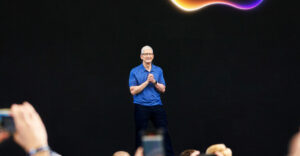
Another year is about to bite the dust and this is my opportunity to look back and ahead broadly and cover the things I haven’t already touched on in this column during the last few weeks. The month began with my discussion of five companies — Sony, Google, IBM, Oracle and Apple — and how four of them would probably drop into decline in 2006. Then I brought up the major technology trends and companies to watch in 2006, and last week’s column focused on the major software and hardware battles of 2005 and 2006.
Now, rather than picking winners or losers, I’d like to focus on things of special importance: relationships, job satisfaction, and building products you can be proud of.
Apple vs. Intel
There is something that has just been nagging me about Apple and Intel. Last week I spent some time with two of Intel’s most visible partners and to say these folks were unhappy with Intel would be a gross understatement. When it comes to the company they are most frustrated with, the OEMs tend to switch between Microsoft and Intel. From my perspective, Intel clearly has the lead right now in terms of aggravation, and in a number of areas.
A main reason for this is that Intel tends to make decisions critical to the success or failure of the OEMs without adequately taking into account the needs of these companies. A few years ago it got so bad I was asked by one of them to try and form an unofficial organization of OEMs that could, almost like a union, coordinate efforts and make Intel bow to their needs. That never took off, thanks to Toshiba’s infamous legal counsel. The point is, this problem is far from new.
Apple, on the other hand, is used to telling IBM and Motorola to jump and having these companies do so vigorously. One of the reasons Apple switched to Intel chips was that IBM was clearly not jumping high or fast enough. Apple also has a reputation for being one of the nastiest partners around, with its recently failed HP relationship as the latest example.
On both sides of this partnership you have companies that are bad at partnering, according to feedback from their partners. Adding to this are rules that force Intel to treat every partner the same, tying them to programs like Intel Inside, Centrino, and Viiv (which Apple probably won’t participate in). Since these programs provide massive advertising subsidies, so massive that AMD is suing Intel for its alleged anti-competitive nature, the financial disparity between the companies like Dell who use these programs and subsidies, and Apple, who probably won’t, shouldn’t be significant.
Now toss in the OEMs’ belief that Intel cut two sweetheart deals with Apple, one providing discounts without ties to Intel’s brand programs and the other to get them the next generation of processors early. Add that these OEMs are watching with attorneys and AMD at the ready if they get proof that either of these situations are true and you have the ingredients for a really interesting year. I’d hate to be the person responsible for maintaining the Intel-Apple relationship. Whoever that is, my heartfelt prayers are with them this season.
Lenovo: IBM PCs Reborn
Speaking of horrid jobs, I’m an ex-IBM employee, and while I remember the people there fondly, I hated working there. IBM is a company of politics and bureaucracy and I’m not particularly good at either. I tend to say what I think, which favors my current career path but didn’t do me a lot of good at IBM. I often felt kinship with the IBM PC company which seemed to continually struggle with the same kind of issues as a unit that I had struggled with as an employee.
While the IBM PC unit started out as the star of the company, it clearly didn’t stay that way. As the ’90s ran out and we got into the 2000s the IBM PC company struggled with direction and had issues with desktop computers which, for the most part, were boring and overshadowed by the industry-leading ThinkPad lines. IBM exited the consumer business, later identified as one of the worst mistakes made by Louis Gerstner, IBM’s now departed CEO, and seemed to languish under an uncaring parent.
IBM competitors were defined by fast moving companies like Dell, which provided good products at equal or lower prices than IBM had and seemed more committed to a business that IBM seemed to care less and less about. Even as the PC unit improved its financial performance, they got little or no respect in the firm. The last slap was the surprise sale of the division to Lenovo, which IBM went to great lengths to showcase as the divestiture of a dying, underperforming division even though that impression was largely manufactured by IBM. This process was incredibly hard on the PC company’s employees and customers, making what happened next rather amazing.
At Lenovo, the Chinese company that purchased the division, recovery was almost immediate. It was so fast that you could immediately see just how massive the drag had been on the division from IBM corporate management. Suddenly the firm was profitable, market share was growing, and the employees were excited about their jobs and new-found flexibility.
IBM once had some of the leading designs of its time. The Butterfly notebook was the first ultra-light notebook that had a full-sized keyboard; the X Series desktop was the precursor to the current iMac and earned a place in the Smithsonian for its design; they even had one of the first tablet products called the Transnote. These products weren’t successful, but they did open the door for follow-on products from others. It was IBM’s lack of vision that blocked the company from enjoying the success that it had enabled for others.
Early last week Lenovo made an amazing change, replacing Steve Ward, the CEO who put the new company together, with a top Dell executive, Bill Amelio. Ward actually stepped aside after recognizing that Amelio would be a better choice to ensure Lenovo’s rapid growth. They are long-time friends and both former IBM employees.
Today, at Lenovo, you can see the excitement on the employees’ faces as they slowly realize the shackles they have been under have been removed. We’ll see how long that smile stays when Amelio comes on board and drives them to move even faster. Expect amazing things from Lenovo in the near future — products that will once again lead in design and, for those of us who love design, once again, these will be products to lust after.
Design: Apple and Voodoo
Speaking of design, one of the things I’m hoping will come out of the Apple-Intel deal is a broad realization that incredible design is once again possible. Over the years the hardware OEMs have consistently used Intel and Microsoft as reasons they can’t build really cool products. Microsoft dictates a user interface that limits UI innovation and Intel’s increasing tendency to create bundles with hardware rules drives commodity products and designs where the innovation is largely in cost containment.
In short, if you ask an OEM why they are building boring products they often blame Intel and sometimes blame Microsoft as well. Now I’ve largely felt that this was just avoiding risk as companies like Voodoo have been building exciting products for some time and they have similar constraints. But Voodoo, and companies of its class, have been stepping out and building some rather cool products and have similar limitations. Unfortunately the large OEMs look at companies like Voodoo as special cases with circumstances that don’t apply to them.
Apple, historically, has been the one company that starts with a great design and tasks the engineers to build it. This is in sharp contrast to the typical Wintel PC approach, which is based on a standard configuration and is then cosmetically altered. Of the standard OEMs, only Sony and IBM, now Lenovo, occasionally embraced the Apple methodology.
If Apple regularly demonstrates an ability to build exciting designs using Intel parts, it will go a long way towards moving the industry into more an era of exciting products overall. This might not be great for Apple but it would be wonderful for those of us that love design and use Windows.
Bill Gates: One of Time’s ‘Persons of the Year’
Speaking of Windows, I’m one of those people who are increasingly upset with the corporate trend of overpaying CEOs and underpaying general staff. This becomes particularly pronounced when you read about competitions between CEOs for the most expensive parties or biggest yachts — this kind of thing adds insult to injury to the burdens their employees already face.
Bill Gates has long advocated that there needs to be a stronger corporate focus on world problems and providing care for the disadvantaged. He has provided out of his own pocket massive amounts of cash to address this need without any apparent payback and with very little credit until now.
If the competition between top executives centered on charitable giving rather than luxury items, the world would become a better place. The Time Magazine honor is well deserved and helps set an example for other executives. Interestingly, unlike most executives, Bill’s wealth didn’t come from an exorbitant salary but from a combination of being relatively frugal in the early years of Microsoft and retaining a large percentage of company ownership. The practice of giving is not only good for the industry it is good for the world. It deserves the credit it is receiving. I hope more will follow Bill and Melinda Gates, and Bono’s, lead.
A Gift for Yourself
Christmas is over, and I’d like to suggest one thing that could come in handy for you. It’s a product called Neatreceipts. It scans images of receipts and pulls off information that you can use in expense reports or import into a variety of other products.
This could be particularly handy if, like me, you tend to lose receipts that you actually need later as proof of purchase for warranties and the like. You’re going to be getting that wonderful January surprise in the form of a credit card bill. Wouldn’t it be nice if you could actually find your receipts so you could actually see that, yes, you really did spend all of that money? And, don’t forget, your next big financial event is probably income tax day when something like this could be incredibly handy.
I hope Santa was good to you and yours this past weekend. Have a wonderful New Year!
Rob Enderle, a TechNewsWorld columnist, is the Principal Analyst for the Enderle Group, a consultancy that focuses on personal technology products and trends.





















































